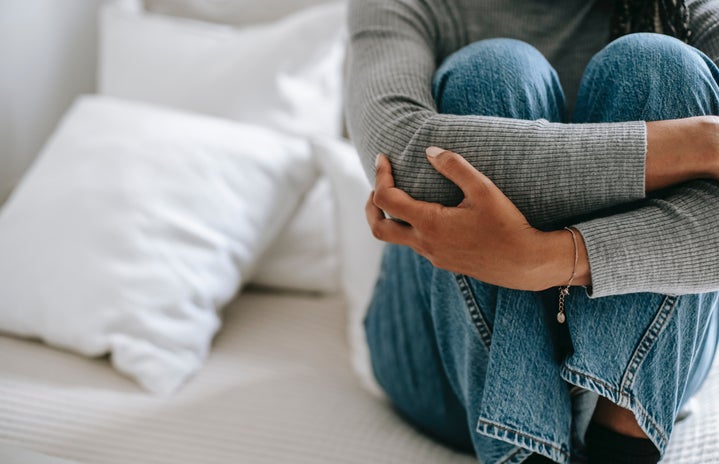I’ve always been a very happy kid, teenager and now, adult. Just like most kids, I consumed myself with Barbies, Manhunt and morning cartoons while crunching on heaps of Fruit Loops or Captain Crunch. When I went into my teen years, those hours playing with dolls and running around the park with local kids on my street, turned into late-night drives with friends around the McDonalds parking lot, parties in people’s basements when their parents went away for the weekend and obsessing over boys who barely even talked to me.
The shift from being a kid to blossoming into a woman can be tough for many girls as our bodies are changing––and so are our hormones. To say I never felt those tough times in my teen years would be a lie, but as I navigated through high school, I realized I didn’t have it anywhere near as bad as other girls.
The more people I developed relationships with, the more I realized how lucky I am to simply be happy. I never went through my adolescence blind to mental health––in fact, it was talked about quite a lot in my family and with friends, but I never realized how many people battle with the chemical imbalances that constantly eat away at our brain.
On top of this, I was always empathetic towards anyone I knew who struggled with mental illness, but I always felt disconnected as I could never fully relate to how they were feeling and never fully understood the deeper meanings behind my words of comfort. Then came February 2021.
When the days got shorter, darker and colder, I became miserable. Leaving my bed was not an option. I cried multiple times a day; all the motivation people used to praise me for left my body at the speed of light. I stopped answering Snapchats and texts from friends and barely spoke to my family at the dinner table. I felt helpless, but was also addicted to the feeling.
After a couple of weeks of loneliness, darkness and tears, my mom noticed that her over-the-top, socially dynamic daughter was missing. She forced me to talk, but there wasn’t much to say. Instead, I just looked her in the eyes as she sat at the edge of my bed and said, “I think I’m depressed.”
Saying those four words led me towards getting help. I started to find coping mechanisms such as walking or self-care nights that helped me feel better, and although the shift back to happiness wasn’t immediate, I was gaining hope. Now, I can tell when my brain is sending me signals that my mental health is suffering and can quickly find ways to snap myself out of it, but this isn’t the case for everyone.
With summer ending and the stress of school flooding my days, I sometimes start to feel myself slipping back into my February 2021 habits and it scares me. When I feel this way, I begin to list all the things I need to do to remind myself that I will be alright.
For those who continue to suffer from their mental health, feel their motivation slowly slipping away from their fingertips and are unable to cope with their feelings, here are a few things I find helpful when I am at my lowest points.
- Take a breather and talk about it
I’m lucky to have a family who loves to talk about their feelings. When I was at the height of my depression, I thought the last thing I wanted to do was let anyone know how I was feeling––but really, my “not speaking” was a call for help, and thankfully, somebody noticed. After the words “I think I’m depressed” left my mouth, I instantly felt a wave of relief. It was finally out. I was now able to move on and get help. From there, I was lucky to have my family check in on me every day and ask how I was feeling. To this day, when I find myself feeling stressed, depressed or anxious, I call my mom and just talk about it. Having parents who are so willing to help me through my poor mental health moments is a privilege that I am forever grateful for, but I’m aware that this isn’t the case for everyone. If parents or family aren’t an option to talk to, reach out to your friends, teachers or therapist. Many campuses have designated therapists or have the resources to set you up with one— so use it!
Here are some links to resources that can help:
- Go for a walk or take some time to exercise
I’ve always been an active person and had a passion for working out. As a kid––and even now as an adult––working out was a way to combat my hyper behaviour. When I started experiencing low points in my mental health, I began to lose the motivation and desire to work out, which can be common among many people who suffer from mental health issues. However, when I wanted to get better, I realized that any bit of exercise I did – even just a casual walk around the neighbourhood, helped me de-stress and disconnect from my depressive thoughts and relax. Even though I had to physically force myself to move by literally dragging myself out of bed many times, the outcome was worth it.
- Self-care
Sometimes just a night alone with a face mask, some tea (or drink of choice!) and some relaxing music playing is all you need to reset and recharge the thoughts in your brain. I find that when I’m feeling low, I neglect the way I look, making me feel worse about myself. The second I start to take time and care for my body––both internally and externally––I begin to feel a bit better.
Take a look at some of my favorite products for a self-care night:
- Find a hobby
Recently, my mental health has been suffering because of the pressures of school. I become stressed very easily with all the work thrown my way––and rightfully so. School is hard and often neglects the fact that students deserve to have a life outside of work. A lot of the time, I struggle to find that balance which leads to feeling stressed and upset. I find that a hobby helps combat the feeling of drowning in school work and can help lift your mood and give you something to look forward to. For me, that activity was baking. Since I like to be busy, I find that it de-stresses me from school while still keeping me preoccupied. Other hobbies could include watching your favourite show or movie, going on social media and/or hanging out with friends. I also realize that I use these ways of entertainment as a reward for getting something done as it motivates me, while also de-stresses me from my hard work.



